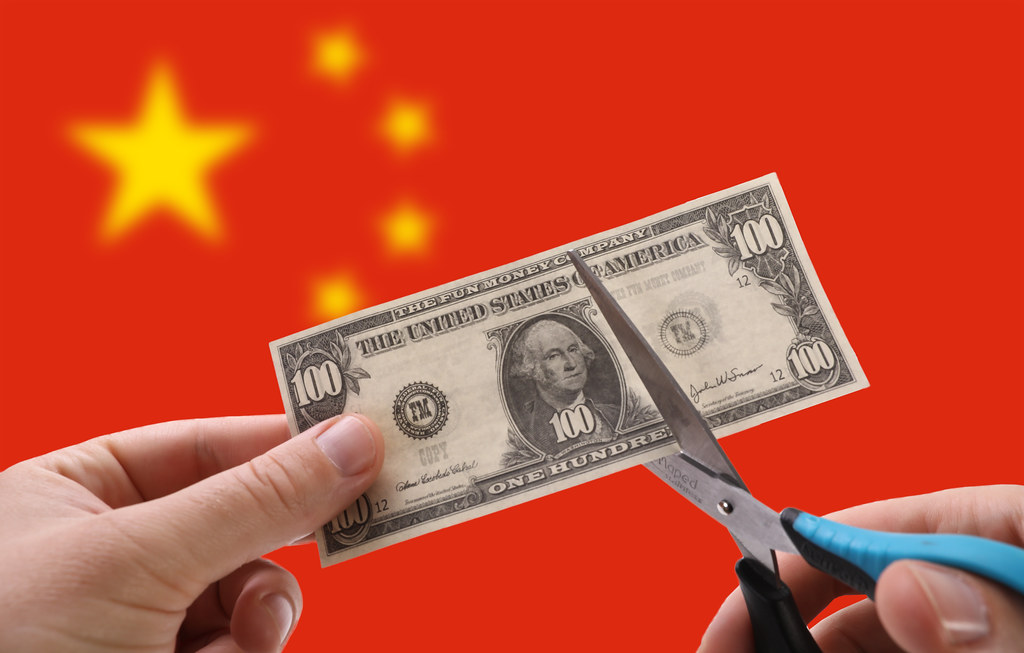Price paid for abuse of privilege

Credit: Jernej Furman/Flickr
By Marcos Cordeiro Pires, for China Daily* [Reposting]
News of a development that will have a significant impact on the international financial system occurred at the end of April when the consultancy Eurizon SLJ Asset Management released a study indicating that the US dollar’s position as a reserve currency suffered a sharp decline in 2022. According to the study, the dollar’s proportion in total global reserves declined from about two-thirds in 2003 to 55 percent in 2021 and 47 percent last year, which indicates an exceptional drop of 8 percentage points in just one year, the highest level since the beginning of the 2000s. This movement has accelerated since the beginning of the Russia-Ukraine conflict.
This trend had already been pointed out by the International Monetary Fund in a paper entitled “The Stealth Erosion of Dollar Dominance: Active Diversifiers and the Rise of Nontraditional Reserve Currencies”, released in March 2022. According to the report, “a characterization of the evolution of the international reserve system in the last 20 years is thus as gradual movement away from the dollar, a recent if still modest rise in the role of the renminbi, and changes in market liquidity, relative returns and reserve management enhancing the attractions of nontraditional reserve currencies”.
The dollar has been the main currency for international transactions and the global reserve currency since the Bretton Woods Agreement in 1944. Over the past almost 80 years, the US currency has become a “collective good”, as all countries and private agents have anchored their money in a supposed safe port based in Washington, the US Federal Reserve System headquarters.
However, despite having the status of an international monetary standard, the Fed’s monetary policy only considers the specificities of the US. It does not consider the externalities of its actions on the world economy. Currently, many countries worldwide are facing sustained recessive pressure due to the abrupt increase in interest rates on US Treasury bonds to combat the inflationary surge that has been occurring since 2021. This fact has forced other central banks to correct their rates upwards in an effort to cool the economy of their nations.
Using the dollar as a political weapon due to its privileged position is a problem of enormous proportions. For example, the Brazilian oil company Petrobras refused to supply two Iranian cargo ships with fuel in June 2019 for fear of circumventing the sanctions imposed against Iran and of being sued by the US Department of Justice, until weeks later when the Brazilian Supreme Court forced the company to fuel the vessels.
Amid mistrust about the dollar and the SWIFT system, the international economic media is increasingly using the word “de-dollarization”, as several countries are looking for ways to carry out transactions with other currencies, such as the Chinese renminbi, the Russian ruble, the Indian rupee or the dirham of the United Arab Emirates.
In this process of de-dollarization, it is worth reflecting on the role of the renminbi. Since 2015 the Chinese currency has been incorporated into the IMF Special Drawing Rights currency basket, and its use is advancing rapidly. In addition, China has created its own international financial transaction system, the Cross-Border Interbank Payment System, which is consolidating itself as a safe alternative to SWIFT. This role will be amplified with the full rollout of the digital renminbi, the central bank digital currency.

In the process of de-dollarization, it is worth reflecting on the role of the renminbi (Credit: amixstudio/Freepik)
The replacement of the dollar as the world’s primary currency is not yet on the horizon. Still, its use as a political weapon is leading countries to seek safe alternatives to guarantee their international reserves and the development of trade free of unilateral sanctions. This movement toward the renminbi can be seen in negotiations between the governments of China and Saudi Arabia for oil transactions and between Russia and China in their foreign trade transactions. In this respect, the institution of the renminbi as an exchange currency between China, Argentina and Brazil is noteworthy.
De-dollarization is a direct consequence of the contradictions of the hegemonic order and the more democratic and multipolar world order that is emerging. In fact, by abusing its status as an issuer of the international reserve currency, the US government is compromising in the medium and long term one of the main foundations of its hegemony, which is control of the global financial system.
* Marcos Cordeiro Pires is a professor of international political economy at the Sao Paulo State University. The author contributed this article to China Watch, a think tank powered by China Daily. The views do not necessarily reflect those of China Daily.
** Originally published at China Daily, May 15, 2023. This article does not necessarily reflect the opinion of OPEU or INCT-INEU.





















